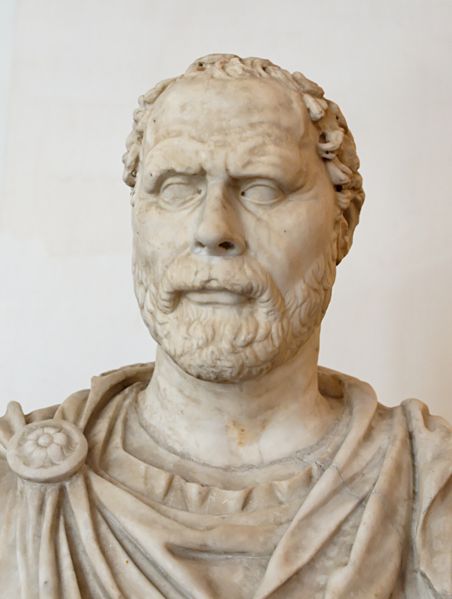 Demosthenes, master statesman and orator, loved his city-state of
Athens. He cherished its way of life and abundant freedoms. And he
believed in standing strong against anyone who might attempt to infringe
on these privileges. This passion, unfortunately, was seldom shared by
his fellow Athenians. While Philip the II of Macedon made bolder and
bolder incursions into the Greek peninsula, the Athenian people seemed
stuck in an apathetic stupor. For years, Demosthenes employed his
powerful oratorical skills in attempts to awaken his fellow citizens
from sleep to the realization of the imminent danger Philip posed. When
Philip advanced on Thrace, the Athenians called an assembly to debate
whether or not to finally heed the great orator’s advice. Demosthenes
was sick of his brethren taking liberty and the Athenian way of life for
granted and he boldly called upon them to rise up and take action.
After his rousing speech, the assembly all cried out, “To arms! To
arms!”
Demosthenes, master statesman and orator, loved his city-state of
Athens. He cherished its way of life and abundant freedoms. And he
believed in standing strong against anyone who might attempt to infringe
on these privileges. This passion, unfortunately, was seldom shared by
his fellow Athenians. While Philip the II of Macedon made bolder and
bolder incursions into the Greek peninsula, the Athenian people seemed
stuck in an apathetic stupor. For years, Demosthenes employed his
powerful oratorical skills in attempts to awaken his fellow citizens
from sleep to the realization of the imminent danger Philip posed. When
Philip advanced on Thrace, the Athenians called an assembly to debate
whether or not to finally heed the great orator’s advice. Demosthenes
was sick of his brethren taking liberty and the Athenian way of life for
granted and he boldly called upon them to rise up and take action.
After his rousing speech, the assembly all cried out, “To arms! To
arms!”Worthy Excerpt:
It is this fate, I solemnly assure you, that I dread for you, when the time comes that you make your reckoning, and realize that there is no longer anything that can be done. May you never find yourselves, men of Athens, in such a position! Yet in any case, it were better to die ten thousand deaths, than to do anything out of servility towards Philip [or to sacrifice any of those who speak for your good]. A noble recompense did the people in Oreus receive, for entrusting themselves to Philip’s friends, and thrusting Euphraeus aside! And a noble recompense the democracy of Eretria, for driving away your envoys, and surrendering to Cleitarchus! They are slaves, scourged and butchered! A noble clemency did he show to the Olynthians, who elected Lasthenes to command the cavalry, and banished Apollonides! It is folly, and it is cowardice, to cherish hopes like these, to give way to evil counsels, to refuse to do anything that you should do, to listen to the advocates of the enemy’s cause, and to fancy that you dwell in so great a city that, whatever happens, you will not suffer any harm.
No comments:
Post a Comment